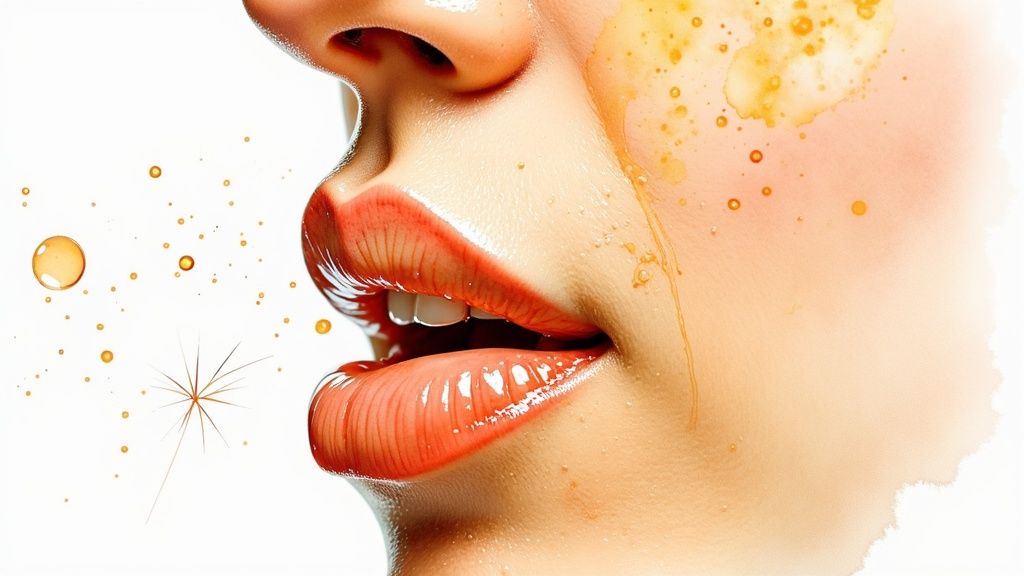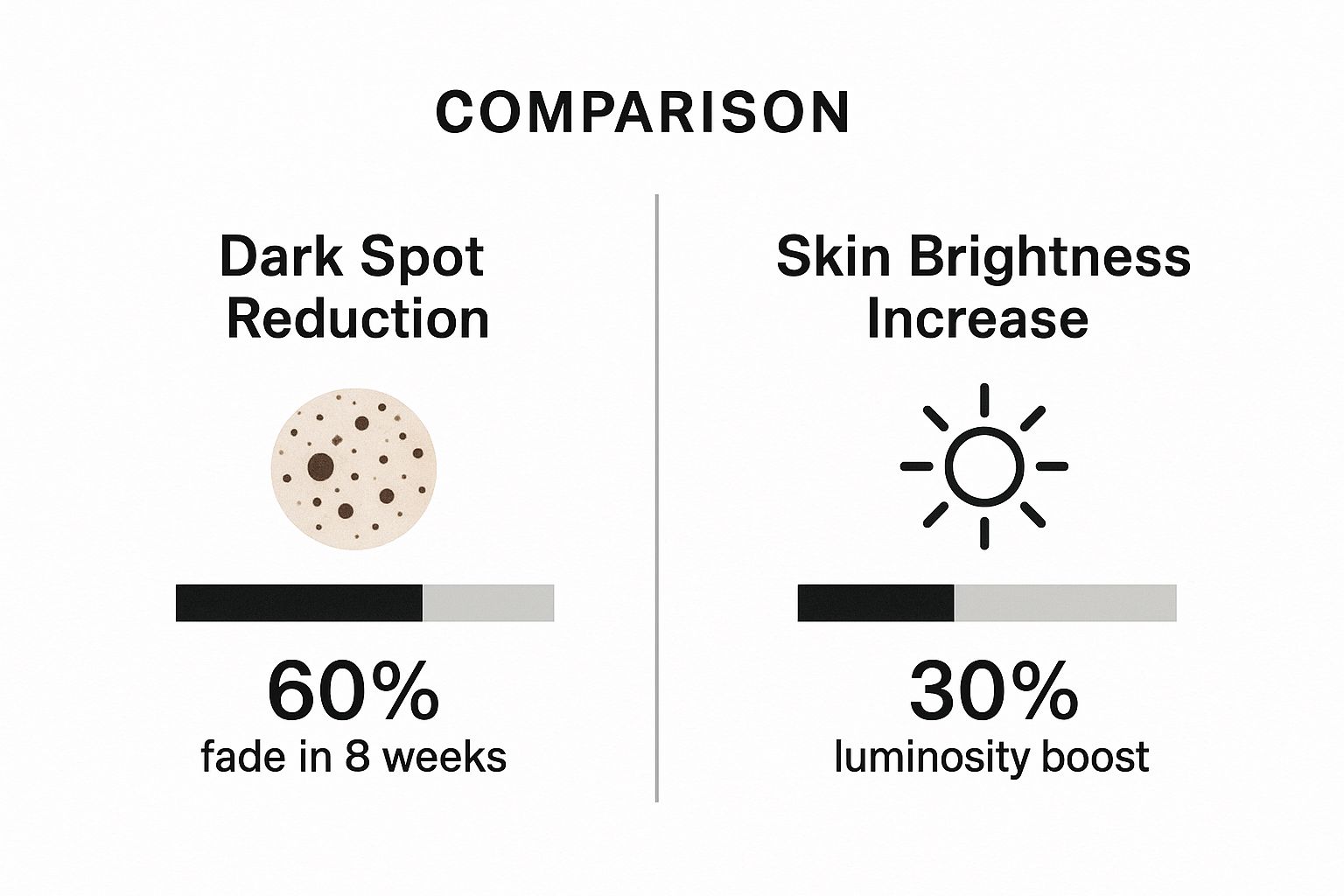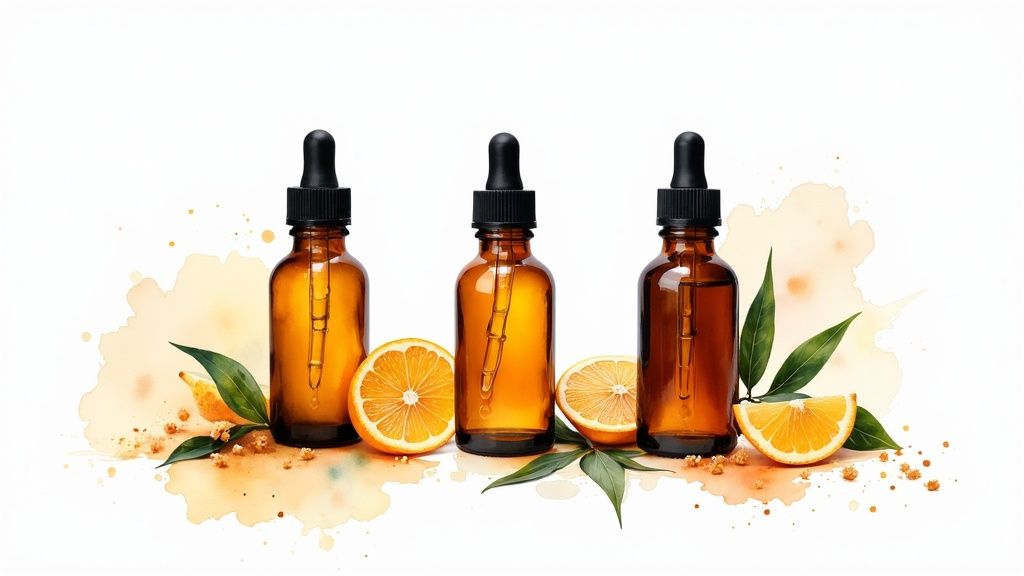
Unlocking the Top Vitamin C Serum Benefits for Skin
When people talk about skincare "powerhouses," vitamin C is usually one of the first ingredients that comes to mind. And for good reason. It's one of the few that can truly brighten your complexion, kickstart collagen production to soften fine lines, and act as a powerful bodyguard against environmental damage.
Think of it as both a corrective and a defensive player for your skin—it helps fade existing issues like dark spots while protecting you from the things that cause premature aging in the first place.
Your Guide to a Radiant and Healthy Complexion
So, you've heard the buzz about vitamin C, but what does it actually do for your skin? Let's cut through the marketing noise and get straight to the science-backed facts. This guide is all about showing you how a well-formulated serum can deliver real, visible results.
We'll break down exactly how vitamin C works to give you that coveted glow, smooth out the appearance of fine lines, and shield your skin from daily stressors like pollution and UV radiation.
Before we dive deep, here’s a quick overview of the key benefits that make this ingredient a must-have in almost any skincare routine.
Key Vitamin C Serum Benefits at a Glance
This table sums up the primary, evidence-based benefits you can expect from adding a quality vitamin C serum to your daily skincare routine.
| Benefit | How It Works | Primary Target |
|---|---|---|
| Brightens Skin Tone | Slows down melanin production to fade dark spots and discoloration. | Dullness, sun spots, post-acne marks |
| Boosts Collagen | Triggers collagen synthesis, leading to firmer, more elastic skin. | Fine lines, wrinkles, loss of firmness |
| Provides Protection | Neutralizes damaging free radicals from UV rays and pollution. | Premature aging, sun damage |
| Enhances Hydration | Helps prevent water loss, keeping the skin's moisture barrier strong. | Dryness, dehydration |
| Reduces Redness | Has anti-inflammatory properties that help soothe irritated skin. | General redness, uneven skin tone |
These are the heavy-hitting benefits that have made vitamin C a staple for dermatologists and skincare lovers alike. Now, let's explore each of these in more detail.
How Vitamin C Works Its Magic on Your Skin

So, what's all the fuss about vitamin C? It's not just hype. The science behind this superstar ingredient is actually pretty straightforward, and it all comes down to two main jobs that completely change your skin's health and appearance.
First and foremost, think of vitamin C as your skin’s personal bodyguard. Its main role is as a potent antioxidant. Every day, your skin is under attack from things like UV radiation and pollution, which create nasty little molecules called free radicals.
You can picture free radicals as tiny pinballs, bouncing around and causing chaos by damaging your healthy skin cells. This damage is what leads to things like fine lines, dark spots, and a dull complexion. Vitamin C swoops in and neutralizes them on contact, stopping the damage before it even starts.
This constant protection is one of the biggest benefits of using a vitamin C serum. You're essentially giving your skin a shield against the daily environmental grind.
It's a Master Builder, Too
Beyond just defending your skin, vitamin C is also a crucial builder. It plays a massive role in collagen synthesis. If you don't know, collagen is the protein that acts like scaffolding for your skin, keeping it firm, plump, and bouncy.
As we get older, our bodies naturally slow down collagen production. That's when we start to see sagging and wrinkles. But here's where vitamin C works its magic again—it actually signals your skin to ramp up collagen creation, helping to rebuild and strengthen that internal support structure.
This one-two punch of defense and repair is what makes vitamin C so incredibly effective. It's not just a quick fix; it's actively working to prevent future damage while rebuilding your skin from the inside out.
Getting a handle on how ingredients like this work is a game-changer. If you want to go a bit deeper, it's worth taking a look at what active ingredients in skincare are all about. Once you understand the "why," you can build a smarter routine where every single product has a purpose.
The Anti-Aging Power of Vitamin C

If there's one thing Vitamin C serum is famous for, it's the incredible way it turns back the clock on aging skin. This isn't just a surface-level fix. It gets to work deep down to protect, rebuild, and bring back that youthful glow, making it a must-have in any serious anti-aging game plan.
So, how does it pull this off? Its main job is to fire up your skin’s collagen-making machinery. Think of collagen as the literal scaffolding that holds your skin up, keeping it firm, plump, and smooth. As we get older, that scaffolding naturally starts to weaken, and that’s when fine lines and wrinkles decide to move in.
Vitamin C is a key ingredient in building collagen, essentially telling your skin cells to get busy making more of it. By reinforcing this support structure from the inside out, the serum helps smooth out those fine lines and firm up areas that have started to lose their bounce. For a deeper dive, our guide on how to stimulate collagen has all the details.
A Dual-Action Approach to Youthful Skin
But Vitamin C doesn't just build; it also defends. As a potent antioxidant, it acts like a shield, protecting your skin from environmental troublemakers like UV rays and pollution. These are the very things that speed up the aging process in the first place.
This protective role is every bit as important as its repair work. By neutralizing those damaging free radicals before they can break down your existing collagen, the serum helps you hang on to the firm, youthful skin you already have.
This dual-action approach—rebuilding lost collagen while simultaneously protecting what you have—is what makes vitamin C such a formidable anti-aging ingredient. It’s both a treatment and a preventative measure in one bottle.
And this isn't just talk; the science backs it up. Studies show that using a Vitamin C serum with a concentration above 10% can create real, visible changes in skin texture and firmness. Many people see a noticeable reduction in fine lines after just 12 weeks of daily use.
Understanding how to care for your skin as it changes over time provides great context for why Vitamin C is so valuable. You can learn more by checking out guides on skincare through the decades.
Achieving a Brighter and More Even Skin Tone
If you're wrestling with stubborn dark spots, the ghosts of breakouts past, or just a general lack of radiance, this is where a vitamin C serum really shines. Its ability to give your skin a luminous, even-toned glow is easily its most famous benefit.
So, how does this magic happen? It all comes down to an enzyme in your skin called tyrosinase. You can think of tyrosinase as the lead worker on the melanin production line—melanin being the pigment that gives our skin its color. When factors like sun exposure or inflammation cause this production line to go into overdrive, you end up with an excess of melanin, which shows up as dark spots and an uneven complexion.
Vitamin C steps in and acts like a savvy supervisor, telling tyrosinase to slow down production. By inhibiting this enzyme, it not only helps fade the discoloration you already have but also works to prevent new spots from ever showing up. It’s a two-pronged approach that gradually reveals a healthier, more vibrant look.
This infographic breaks down the kind of results you can see with consistent use, showing its impact on both dark spots and overall brightness.

As the numbers show, dedicated use can lead to a significant reduction in hyperpigmentation and a real, visible boost in your skin's natural glow.
How It Fades Hyperpigmentation
The serum’s power isn't just for sun spots, either. It’s a fantastic tool for tackling other kinds of hyperpigmentation.
By interrupting the melanin production cycle, vitamin C helps your skin systematically clear out concentrated pigment deposits. This allows a brighter, more uniform skin tone to emerge from underneath as your skin cells naturally turn over.
This makes it an excellent choice for anyone dealing with post-inflammatory hyperpigmentation (PIH)—those frustrating dark marks that linger long after a pimple has healed. Digging into what causes uneven skin tone can shed more light on why this is so effective. Ultimately, its ability to both fade existing spots and prevent new ones makes it a true powerhouse for achieving a clear, even complexion.
How to Choose the Right Vitamin C Serum

Walking down the skincare aisle, it's easy to feel overwhelmed by the sheer number of vitamin C serums out there. With so many options, how do you pick the right one? The secret isn't finding the single "best" serum on the market, but rather finding the one that’s the perfect match for your skin.
It all starts with the form of vitamin C in the bottle. The heavy hitter is L-Ascorbic Acid, the most potent and well-researched form of vitamin C. It delivers serious antioxidant power and gets to work on collagen production. But, that strength can sometimes be a bit much for sensitive or easily irritated skin.
If your skin is on the reactive side, don't worry. Gentler alternatives like Sodium Ascorbyl Phosphate or Magnesium Ascorbyl Phosphate are fantastic options. They might be less intense, but they still pack a punch when it comes to brightening and protecting your skin, just with a much lower risk of causing redness or stinging.
Finding Your Potency Sweet Spot
Next up is concentration. You'll find serums with percentages ranging from a mild 5% to a super-potent 30%. For most people, the magic happens somewhere in the middle. The sweet spot for getting real, visible results without tipping over into irritation is generally between 10% and 20%.
This isn't just an anecdotal tip; it’s backed by massive consumer preference. In 2023, the global vitamin C serum market hit a value of USD 1.27 billion, and guess what? Formulations in that 10% to 20% range accounted for over half of all sales. It’s a clear signal that this is the concentration where most people see the benefits they’re looking for. You can explore more details in the latest vitamin C serum market trends from Data Bridge Market Research.
Pay close attention to the packaging. Vitamin C, especially L-Ascorbic Acid, is notoriously unstable and breaks down when exposed to light and air. Always choose serums in dark, opaque, and airtight bottles to protect the formula's potency.
To make the best choice, it helps to see how the different forms of Vitamin C stack up against each other based on your skin type and goals.
Comparing Common Forms of Vitamin C
Here’s a quick breakdown of the most popular Vitamin C derivatives to help you find the best match for your skin.
| Vitamin C Form | Best For | Key Feature | Potency Level |
|---|---|---|---|
| L-Ascorbic Acid | Normal, oily skin | Maximum potency for fast results | High |
| Sodium Ascorbyl Phosphate | Acne-prone, sensitive skin | Gentle, anti-inflammatory properties | Moderate |
| Magnesium Ascorbyl Phosphate | Dry, sensitive skin | Hydrating and less irritating | Moderate |
| THD Ascorbate | All skin types | Very stable, oil-soluble for deep penetration | High |
Ultimately, choosing the right form and concentration comes down to listening to your skin. What works for someone else might not be your perfect fit, so use this as a guide to start your search for that glow-giving bottle.
Your Vitamin C Serum Questions, Answered
Adding a new product to your skincare lineup always comes with questions. When should I apply it? What can I mix it with? Getting these details right is the secret to unlocking everything a great vitamin C serum can do.
Think of this as your go-to guide for getting the best possible results. I'll walk you through the most common questions to help you sidestep any rookie mistakes and get your skin glowing.
When Is the Best Time to Apply It?
Hands down, the best time to apply your vitamin C serum is in the morning. Right after you cleanse and tone, just press a few drops into your skin. Give it a minute to sink in before you move on to your moisturizer and—this is non-negotiable—your sunscreen.
Why the morning? Because its powerful antioxidant properties act like a shield against everything the day throws at you. It neutralizes the free radicals churned out by UV rays and pollution, essentially giving your sunscreen a super-powered sidekick.
Can I Use It with Retinol?
Both are absolute powerhouses in skincare, but you'll want to keep them separate to get the most out of each one and avoid potential irritation. Your skin has different needs in the morning versus the evening, so think of it as giving your skin the right tool for the job at the right time.
Here's a simple, effective schedule to follow:
- Morning: Apply your vitamin C serum. Its job is to protect.
- Night: Use your retinol. Its job is to repair and encourage cell turnover.
This tag-team approach lets each ingredient shine without getting in the other's way. You really do get the best of both worlds.
By separating vitamin C and retinol, you allow each ingredient to work in its optimal environment. Vitamin C thrives in the morning to protect, while retinol works best at night to repair, creating a perfectly balanced skincare strategy.
How Can I Tell If My Serum Has Gone Bad?
The easiest way to tell is by looking at the color. A fresh, stable vitamin C serum (especially one with L-Ascorbic Acid) should be clear, champagne-colored, or a very light straw yellow.
If you open the bottle and see a dark orange or brown liquid, that’s a red flag for oxidation. It means the serum has been exposed to too much light, air, or heat and has broken down. An oxidized serum isn't just ineffective; it can actually irritate your skin. At that point, it’s time to toss it.
How Long Until I See Results?
Skincare is a marathon, not a sprint. While some people notice a brighter, more luminous look in just a couple of weeks, the real magic takes a bit more time.
For bigger changes—like seeing those dark spots fade or fine lines soften—consistency is everything. Most studies show that you need to stick with it for at least 8 to 12 weeks of daily use to see significant improvements. Just remember, good things take time. You’re building healthier skin from the ground up.
At Olive Skin Therapy, we're passionate about helping you reach your skin goals with professional advice and treatments tailored just for you. Schedule a consultation with us today and let's build a routine that leaves your skin healthy and radiant.
